
We don’t always talk about stress through chord progressions. But maybe we should.
A recent study from Ultimate Guitar, the world’s most popular tab site and part of Muse Group, reveals that for many, relief begins with six strings and a quiet moment with their instrument. An overwhelming 85.23% of surveyed guitarists ranked playing music as their top stress-relief activity, ranking above social media, physical activities, socializing, and meditation.
In a survey of 1,828 Ultimate Guitar creators, 56.35% said that they play the guitar to unwind, process emotions, and relieve stress. For them, the guitar is not just an instrument – it’s a tool for emotional well-being. Whether it’s unplugging with an acoustic ballad or blowing off steam with a classic riff, guitarists are leaning into music not just as a hobby, but as a way to stay grounded.
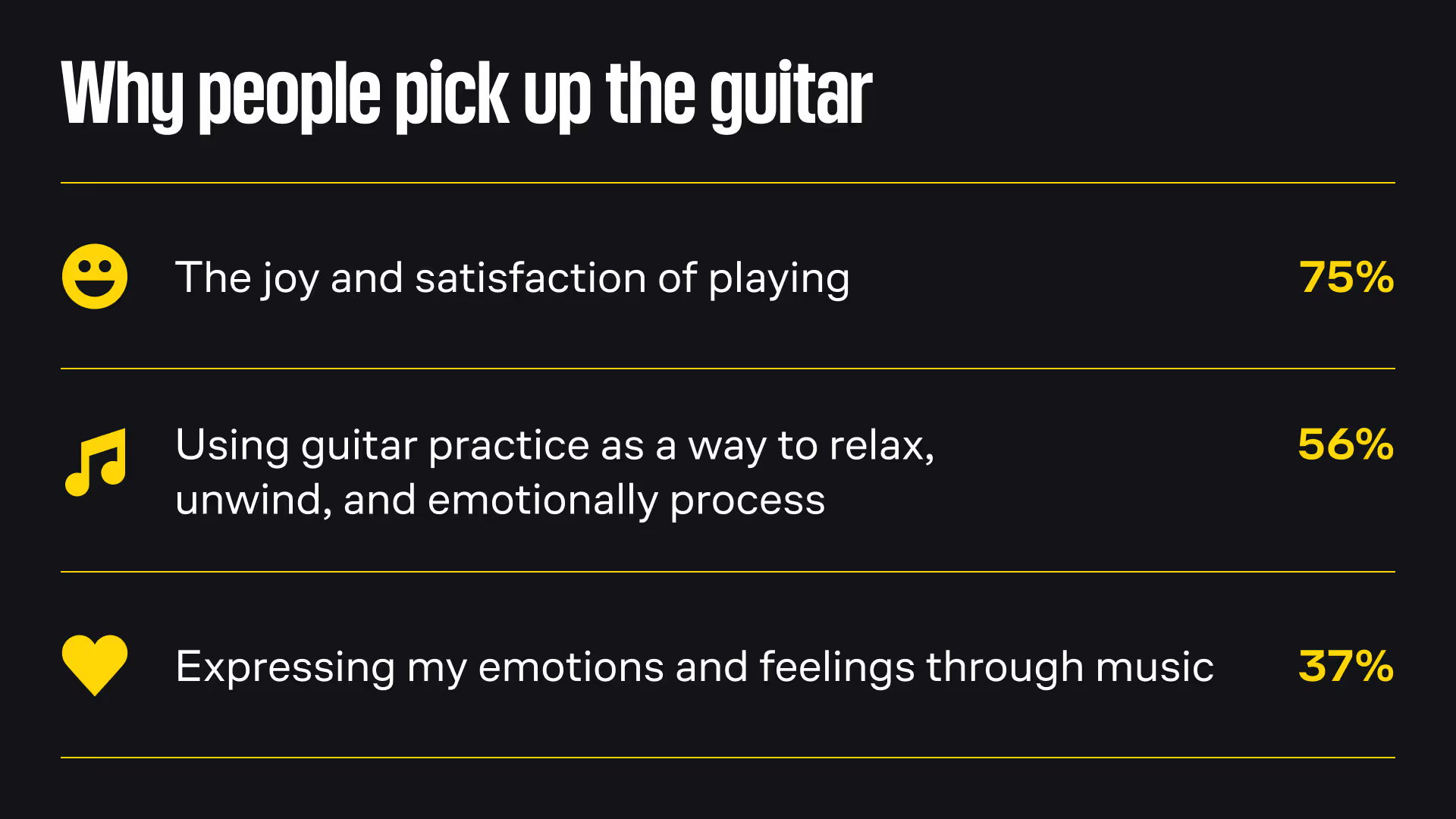
Survey Sample
The study surveyed 1,828 Ultimate Guitar creators with diverse skill levels and playing styles. Participants were categorized into three main groups:
- Hobbyist Players – casual guitarists who play for fun and relaxation.
- Performing Enthusiasts – musicians who primarily play covers and share performances online.
- Creative Musicians – musicians who actively write, compose, and perform.
The majority of respondents were male (76.26%), while 17.94% identified as female, and the remaining participants identified as non-binary or preferred not to disclose their gender. The age distribution among respondents was relatively even, with 26.15% aged 55 and older, 25% aged 18-24, and 23.47% aged 35-44.
Guitar as a Dominant Stress-Relief Activity
The stress-relieving power of music became especially evident during COVID-19, one of the most stressful periods for people globally. A 2023 study published in Frontiers in Psychology found that 25% of participants “strongly agreed” and 54% “agreed” that listening to music became an important way to manage stress. Ultimate Guitar decided to go one step further and explore how actively making music – playing guitar – influences emotional well-being.
Our study found that 85.2% of Ultimate Guitar creators consider playing a musical instrument their primary way to relieve stress. Creative Musicians choose this option most often (90.13%), followed by Performing Enthusiasts (88.49%) and Hobbyist Players (83.31%). When not playing, respondents turn to listening to music (74.73%) or watching movies and TV shows (47.81%). Meditation and yoga ranked only 16th and 17th among preferred relaxation methods.
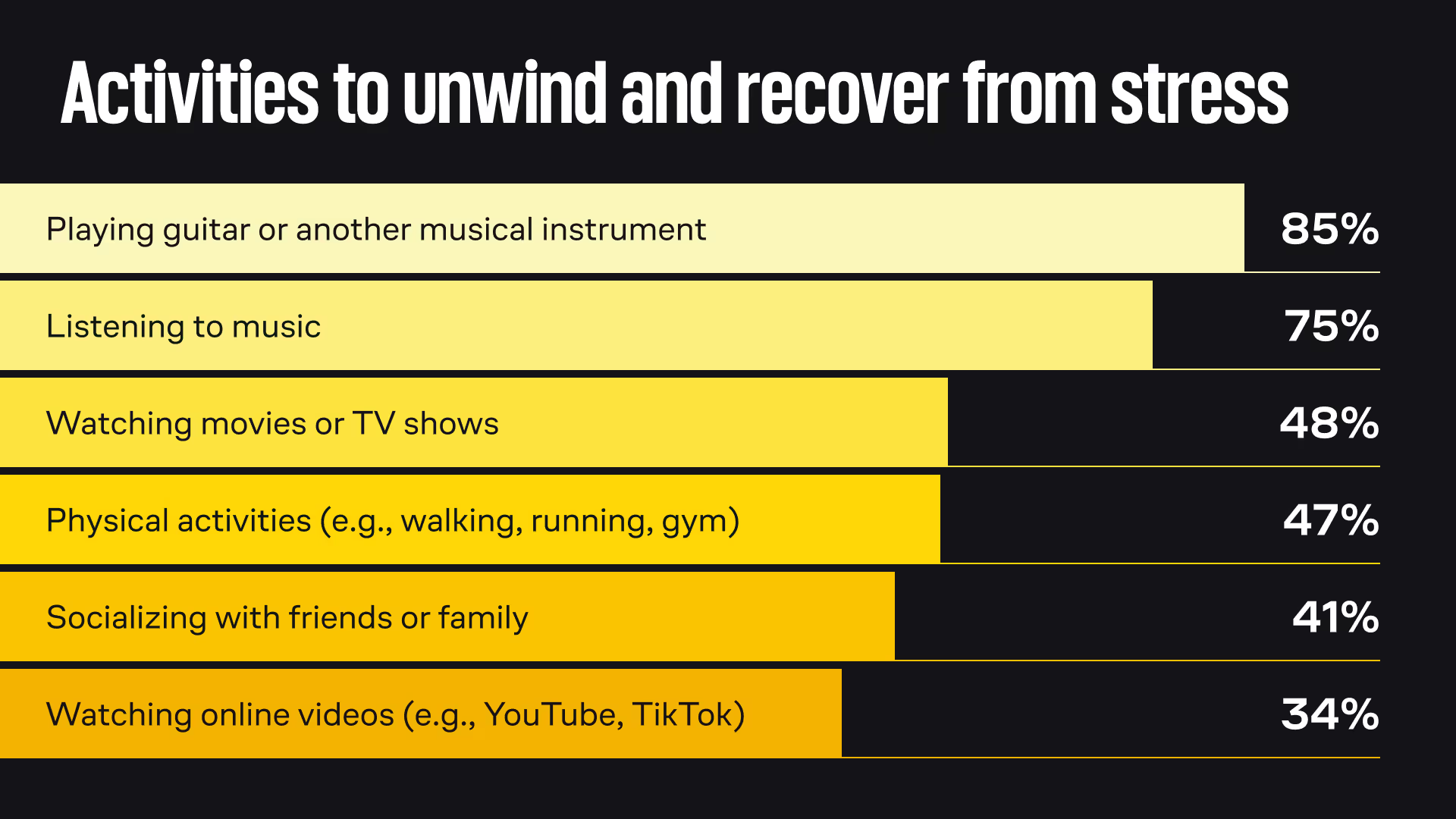
“Playing guitar is like meditation for me. Music immerses me into another world,” shared one of the survey participants.
“When my head is buzzing, playing and singing helps take some of that buzzing away. It kinda feels like letting some of the internal screaming out in a controlled way,” said another guitarist.
For others, it's part of a regular emotional reset: “Whenever it's been a rough day, the first thing I do when I get home is reach for my guitar. It helps me to process my day, while my fingers have something to do and I have something to listen to, I can go through and unpack and unwind my day”.
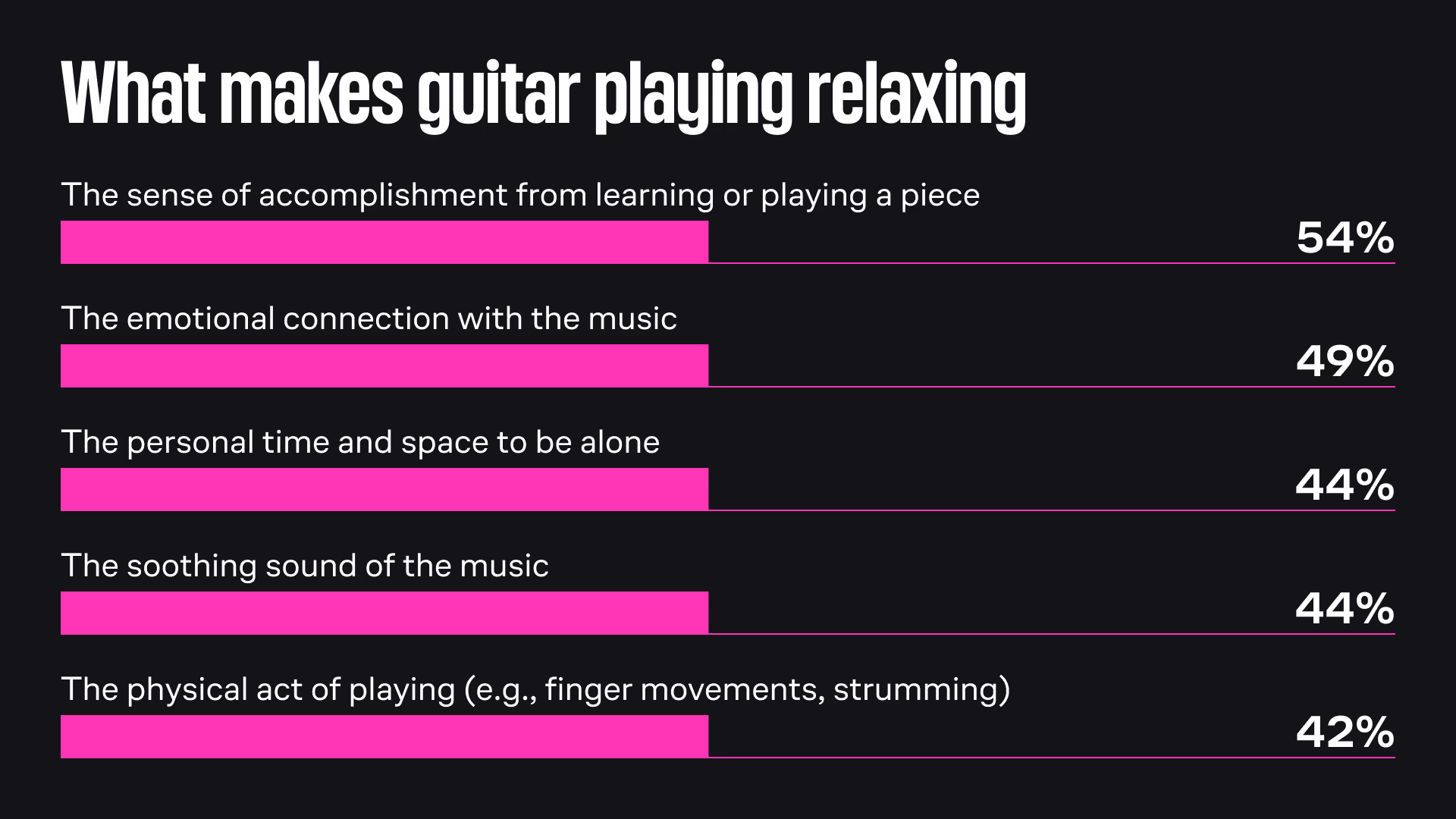
Emotional and Mental Benefits of Playing Guitar
The responses show just how much playing guitar influences emotional well-being and personal growth. The most commonly reported feelings after a guitar session were fulfillment (53.61%) and a sense of calm or relaxation (40.81%).
“I was really angry with some people, so I decided to try and learn a very tricky riff that I knew I couldn’t play at full speed; after a few hours, I was pretty close to nailing it, and I wasn’t angry anymore.”
One of the most cited emotions after a guitar session is the feeling of accomplishment from learning or playing a piece (53.83%). Some even use it to help manage ADHD:
“Having ADHD, playing guitar shuts down every tab in my head that’s still open or helps me process the day or week.”
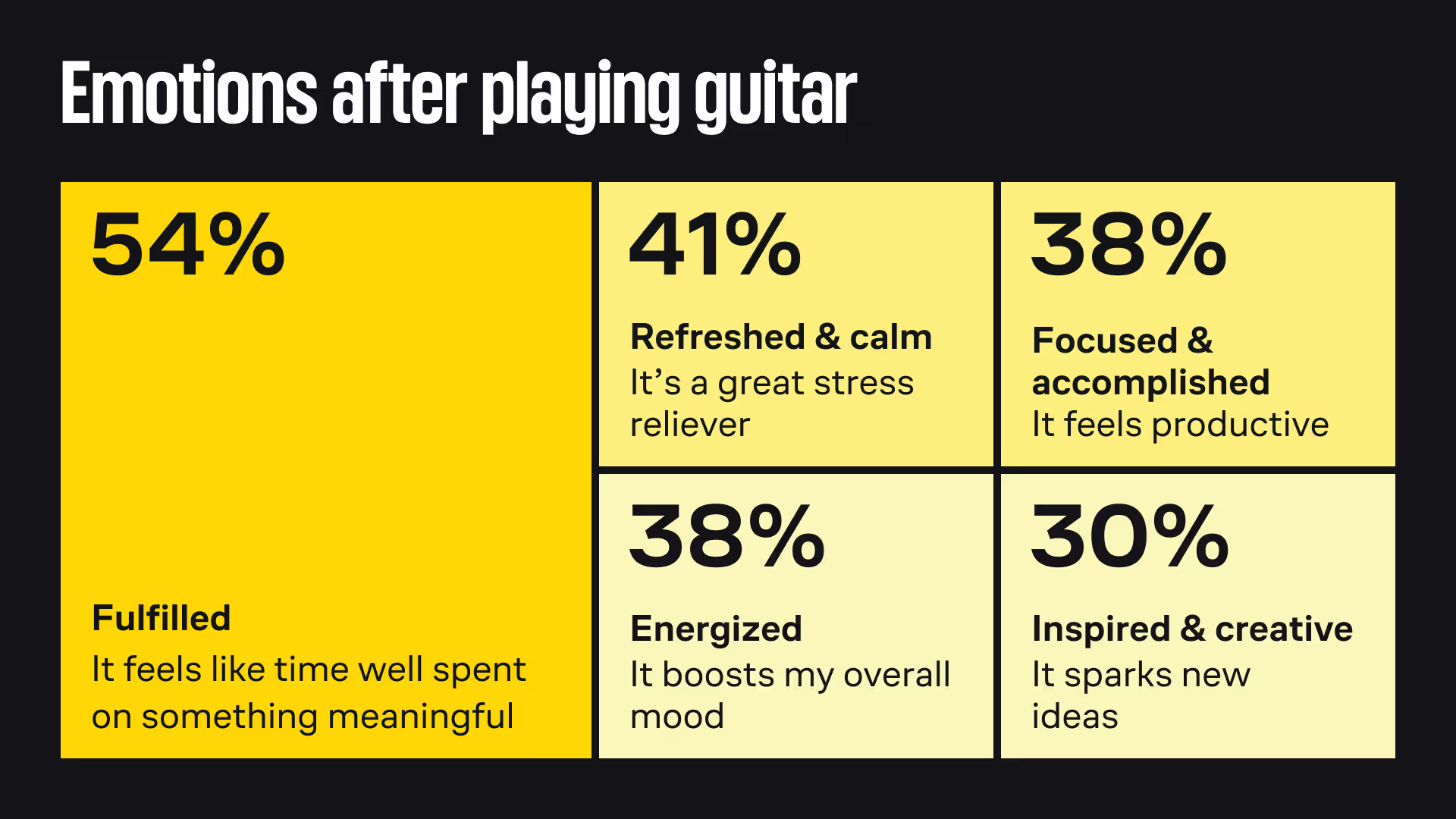
Emotional connection with music is especially strong for 66.45% of Creative Musicians and nearly half of all respondents (49.33%). Performing enthusiasts also score high in this category (54.03%), while hobbyist players rate it lower (45.87%).
Another important aspect is that playing or practicing guitar creates personal time and space for relaxation. Nearly 44% of players say that having this time to themselves is a crucial factor in their mental well-being.
The physical aspects of playing also add to relaxation. 43.62% of respondents say the sound of music itself helps them unwind, with Performing Enthusiasts (47.58%) and Creative Musicians (48.46%) valuing this element slightly more than Hobbyist Players (41.65%). Additionally, 42.41% of respondents find the act of playing – such as strumming or finger movements – calming and restorative.
The Best Music for Stress Relief
Among almost 2,000 respondents, more than half (54.46%) prefer acoustic guitar over other types. Electric guitar comes next at 35%, while bass (8.1%) and classical guitar (2.44%)– the one with nylon strings – are the least common choices.
When it comes to music genres that help guitarists manage stress, the results are quite interesting. Rock – everything from classic bands like Pink Floyd, The Beatles, and Led Zeppelin to alternative, hard rock, metal, and punk – dominates the list, with 29% of participants choosing it as their go-to music for relaxation. This might be because rock songs often have challenging riffs, making them more rewarding to play. Or maybe, people just love playing the classics.
The second most popular category is folk and acoustic music (16.36%), which includes fingerstyle, folk rock, ballads, and soft rock. Blues and jazz come in third, preferred by 12.27% of respondents.
About 11% of guitarists choose what to play based on their mood, switching between different genres rather than sticking to a single style. The list continues with country and Americana (10%), followed by Christian and worship music (8.18%), and pop and mainstream songs (7.73%).
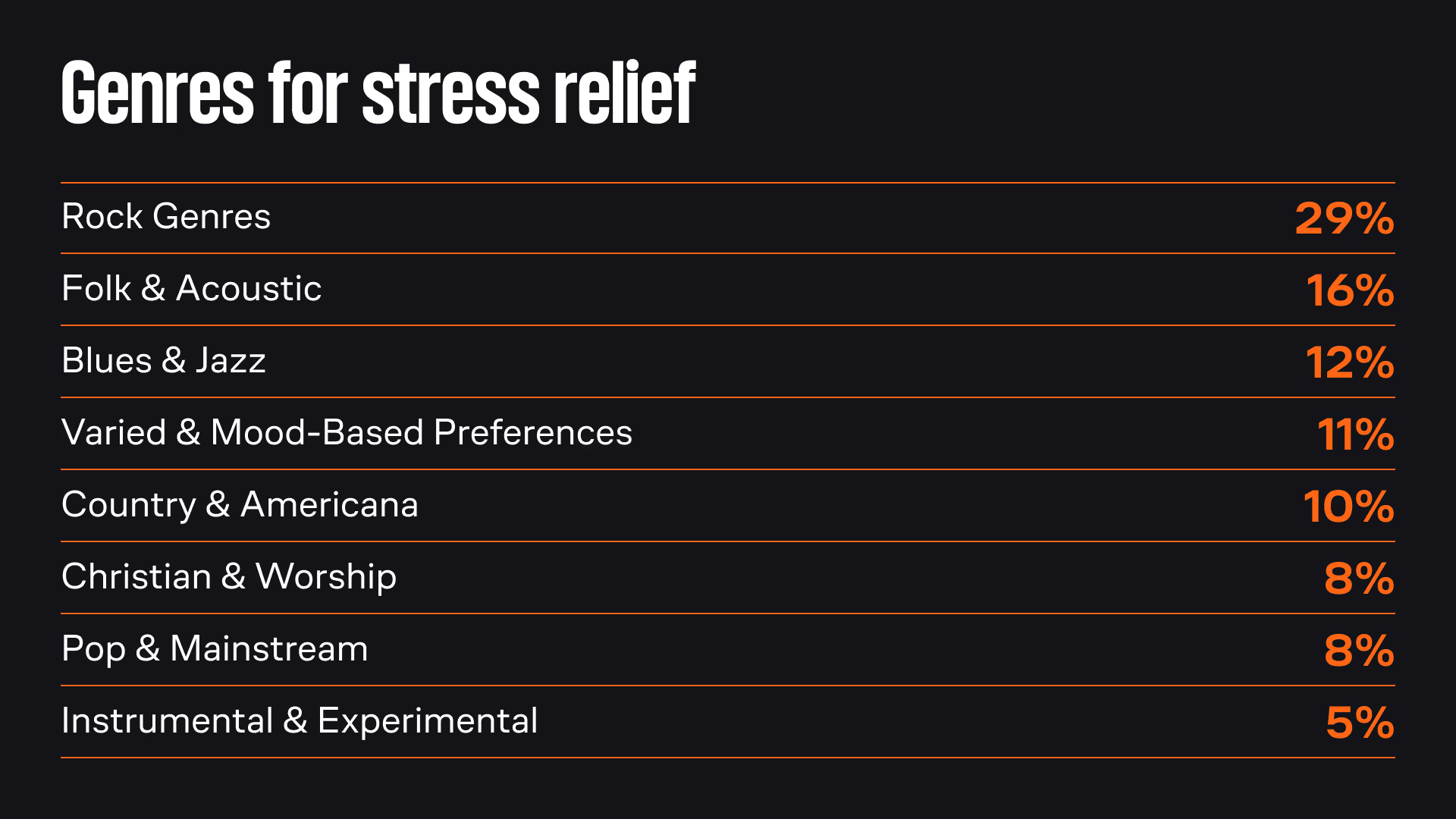
Instrumental and experimental music, such as ambient, lo-fi, improvisation, progressive, and Spanish guitar, rounds out the list with 5.45% of respondents choosing these styles for stress relief.
No matter the genre, playing music is a way to unwind, surpassing sports, meditation, socializing, video games, and content binging. It brings out different emotions and gives people a way to express themselves creatively.
“We hear this from our community all the time – playing guitar isn’t just about music, it helps them relax and clear their mind. I felt the same way during COVID – picking up my guitar became part of my routine and made a real difference. That’s why we wanted to dig deeper. We asked nearly 2,000 Ultimate Guitar creators how they feel about playing, and the results show that it’s not just a hobby, but something that helps them unwind and stay grounded – and we’re proud that Ultimate Guitar is part of that experience”, said Eugeny Naidenov, CEO and Founder of Muse Group.








